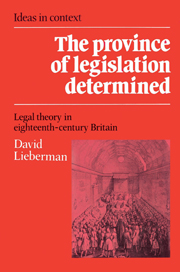10 - Penal law reform
Published online by Cambridge University Press: 10 October 2009
Summary
In contrast with much of the material considered thus far, parliament's enactment of a voluminous and savage body of penal law as well as the contemporary criticisms of this legislation are relatively familiar features of eighteenth-century history, which have earned the attention of scholars not directly concerned with the technical history of English law. Radzinowicz began his monumental survey of the criminal law by charting the content of these enactments, the uneven and restrictive manner of their execution and the reformist penal theory which came to be articulated in condemnation of them. More recently, social historians have examined the phenomenon of criminality itself, the law which defined it and the ideology evinced by it, and have found these matters “central to unlocking the meanings of eighteenth-century social history.” In these studies, as in the more traditional accounts, “this flood” of criminal legislation survives as “one of the great facts of the eighteenth century.”
The approach adopted in this study makes it possible to treat this “great fact” as an element in a larger set of developments in law and legal theory. From this standpoint, parliament's penal acts can be seen as another, clearly the most spectacular, manifestation of its emergence as an active law-making institution, while the doctrines of the penal reformers can be seen as another instance of legal speculation addressing itself to this development.
- Type
- Chapter
- Information
- The Province of Legislation DeterminedLegal Theory in Eighteenth-Century Britain, pp. 199 - 216Publisher: Cambridge University PressPrint publication year: 1989
- 1
- Cited by

